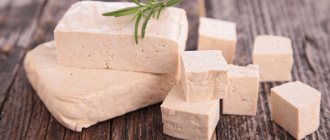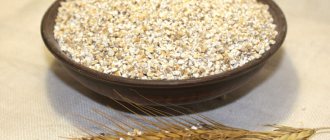Carob syrup has been used for weight loss relatively recently. For a long time, this tonic product was used mainly as an anti-cold and immunomodulatory agent. In Portugal, Malta and Sicily, carob fruits are used to prepare a kind of chocolate substitute, which does not have invigorating properties, but tastes and smells like a cocoa bean product. And in Cyprus there are so many carob trees that its fruits are used to feed livestock. The syrup is obtained either by evaporating the fruits with water, or in the classic way - boiling with water and granulated sugar.
What is carob?
Carob grows in Cyprus, Spain, Italy and other Mediterranean countries. Its fruits are pods similar to bean pods, although their size can reach 30 centimeters. Both the tree itself and its fruits, as well as the powder and syrup from them, are called carob.
Historically, these fruits have other names: “Egyptian fig”, “John’s bread” (it is believed that John the Baptist ate carob in the desert), Constantinople pods. Seeds have been used as a measure of weight since Biblical times.
The peculiarity of these beans (carob belongs to the legume family) is their very sweet and juicy pulp, which contains up to 50% sugars. This pulp is used to produce a “substitute” for chocolate and cocoa – keroba.
The taste of carob is slightly astringent, reminiscent of cocoa with sugar, therefore, in the process of preparing a drink from carob, there is no need to add sugar.
Carob juice is used to produce syrup, which is used in cooking, medicine, and, more recently, for weight loss.
Raw materials for production
The raw material for making syrup is the fruit of the carob tree, which is distinguished by its impressive size, spreading crown and hard, feather-like leaves.
The fruit of the tree is a massive pod that visually resembles a horn and when ripe contains up to 17 grains surrounded by juicy pulp rich in natural sugars.
Cooking technology
The process of producing syrup from carob fruits is quite simple - the final product is the result of evaporation of ripe fruits, chopped into pieces, mixed with water without adding sugar.
Composition and properties of carob
Carob fruits are useful due to their diverse composition, they are rich in vitamins (A, C, D, E B, B2, B3, B6, PP), amino acids (contain almost the entire set of essential and non-essential amino acids), minerals (per 100 g : potassium – 1100 mg, calcium – 307 mg (much more than milk and cottage cheese contain!), iron – 104 mg, phosphorus – 79 mg, magnesium – 42 mg, sodium – 13 mg, zinc – 0.59 mg, manganese – 0.4 mg, copper – 0.23 mg, as well as barium and nickel), dietary fiber, therefore they are used in dietary nutrition, especially in the nutrition of patients with diabetes mellitus, with impaired metabolism of fats and carbohydrates, as well as with excess weight.
The calorie content of carob is 222 kcal per 100 g of product, it contains 4.6 g of protein, 0.7 g of fat, and 89 g of carbohydrates.
With the help of tannins from carob fruits, it is possible to deactivate toxins in the body, and carbohydrates in the fruits give carob stickiness, which is used in the food industry to make a thickener such as carob gum (E 410).
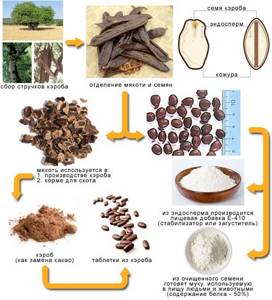
In most cases, it is still possible to buy carob only through online stores or in some health food stores. It is sold both raw and fried.
Another advantage of carob is that it does not contain:
- psychotropic substances in chocolate - caffeine and theobromine, which are addictive and provoke allergic reactions. In addition, the influence of caffeine on our feelings and alertness is known, it causes rapid heartbeat, nervousness, unreasonable anxiety, caffeine can remove vitamins C and group B, provoke sharp jumps in blood sugar, in general, create a lot of troubles for our body;
- the substance phenylethylamine, which also contains chocolate, so people sensitive to this substance will not suffer from migraines by consuming healthy carob;
- oxalic acid (which is found in many plants, as well as coffee, chocolate, cocoa and some teas), which binds calcium, causing the body to stop absorbing it, which leads to a deficiency of this mineral;
- the substance salsolinol (chocolate contains it), which is what develops dependence and constant craving for chocolate;
- harmful fats and cholesterol, and the benefit of consuming carob also lies in the fact that it prevents the absorption of cholesterol from other foods, and is 2 times more effective than other dietary fibers.
As for the beneficial properties of carob, they are quite diverse:
- Tsaregrad pods have a calming effect,
- promote the removal of parasites and counteract bacteria,
- create a feeling of fullness and help reduce fat deposits,
- improve the condition of the gastrointestinal tract, as well as the digestion process,
- helps reduce the level of low-density lipoproteins - bad cholesterol,
- help in the prevention of cancer,
- and, ultimately, carob has a pleasant taste, although some note that, despite its sweetness, the aftertaste of carob remains bitter.
Thanks to such beneficial properties, it can be safely recommended for use for:
- obesity and diabetes mellitus,
- gout and kidney stones,
- vegetative-vascular dystonia and chronic migraine-like pain,
- allergies to chocolate in children (carob is most often found in desserts and baby purees, not cocoa),
- diarrhea in newborn babies, as well as with their frequent regurgitation,
- During pregnancy and lactation, mothers have to give up coffee because of its stimulating properties, so a drink made from carob flour can be a salvation for them.
For chocolate lovers, carob is also a great alternative. After all, a lot of culinary dishes are prepared from its fruits: carob bars, which are in no way inferior to chocolate bars (and they do not contain sugar, so they can be consumed even if diagnosed with diabetes), hot chocolate and cocoa drink, cocktails (chocolate, soy and milk) and puddings, muffins and cakes, liqueurs and compotes, candies and bars, waffles and gingerbread cookies, chocolate glaze and “chocolate” coating on ice cream, condensed milk and processed cheese.
And many people still buy carob for weight loss. How can you reduce weight using these pods?
What diseases does carob syrup help with?
The syrup cleanses and soothes well. For insomnia or problems with constipation, drink it at night. This helps solve two problems at once - restores sleep and improves digestion. The syrup is drunk in pure form (1 tsp per dose) or diluted in water. The amount of water depends on taste preferences - you can take 100 or 200 ml, it does not play a special role.

The syrup is effective for shortness of breath, rapid heartbeat, high blood pressure, and anemia. It is recommended to use it to prevent the development of cancer tumors.
The use of syrup is beneficial for a large number of ailments:
- with impaired metabolism;
- chronic constipation;
- during menopause;
- colds and viral diseases;
- for kidney and bladder stones;
- depression;
- for lung diseases;
- oncology;
- with dysbacteriosis;
- impotence;
- with inflammation of the oral mucosa;
- migraine;
- with vegetative-vascular dystonia.
For smokers, carob syrup will help cure chronic bronchitis. Thanks to the antioxidants included in the product, it prolongs youth.
Carob syrup for weight loss
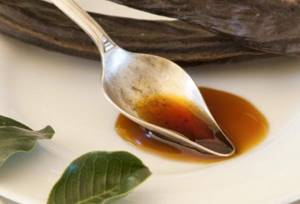
For several hundred years, an excellent remedy for coughs, bronchitis, sore throats and colds, as well as gastrointestinal disorders, has been known - carob syrup. Now it is recommended not only by traditional medicine, but also by traditional medicine for problems with sleep and poisoning, sludge and diarrhea, stress and insomnia, to strengthen bones, teeth and improve immunity. And recently there has been talk about losing weight with the help of this syrup.
To prepare the syrup, take the pods and evaporate them with water or boil them in water sweetened with sugar. The most interesting thing is that without adding sugar, the boiled syrup is twice as sweet as regular sugar syrup! Of course, if you are trying to lose weight, you should use syrup evaporated with water without sugar - this will reduce its calorie content.
- We were all told as children that eating sweets before meals would kill your appetite. If you drink sweet carob syrup before meals, you will already feel somewhat full and will eat less food later. By helping to increase sugar levels due to the fructose contained in carob, the syrup also helps fill the stomach.
- In addition, sweet syrup will help you survive restrictions on sweets during the weight loss process. It becomes much easier to mentally survive the necessary refusal of sweets.
- If the body has enough minerals such as calcium, iron and magnesium, metabolic processes accelerate, excessive appetite decreases and the person loses weight. But, as I wrote above, the fruits of the Tsaregrad pods contain these minerals.
To lose weight, syrup should be used as follows: mix 1 tbsp. syrup with 200 ml of water and juice of 1/4 lemon and consume 5-15 minutes before. before eating. At first, the drink is consumed twice a day before meals: in the afternoon and in the evening, after 2 weeks add a third dose - in the morning, if there is no discomfort.
You should not replace a meal with such a drink, as some recommend. Malnutrition causes your metabolism to slow down, making it much more difficult to lose weight.
Of course, do not forget that a drink made from carob syrup will only be beneficial if your diet is balanced and your physical activity is adequate to the calories you eat per day. It is impossible to lose weight by drinking a glass of this drink before dinner and 15 minutes later. “having eaten” him pizza in front of the TV...
Contraindications and harm

Contraindications for carob syrup include:
- personal intolerance, which usually develops in people with an allergy to fructose;
- children's age (up to 2 years).
In addition, people using syrup made from carob fruits should remember that the fructose contained in the product is poorly absorbed when mixed with lactose in milk, which can lead to flatulence and diarrhea. However, as a rule, these consequences occur exclusively in individuals with lactose intolerance.
Those who decide to lose weight with it should also use the syrup with caution. People using recipes containing this product must carefully calculate both the number of calories and the amount of simple carbohydrates entering the body at each meal. Otherwise, the indicators will be too high, and the diet will not bring results.
Attention! Switching from coffee and cocoa to drinks with syrup made from carob fruit may lead to some caffeine withdrawal symptoms.
Treatment with carob syrup
If we return to the benefits of carob syrup, you can use the following recipes to treat many problems:
Removing toxins, treating vomiting, diarrhea and gastrointestinal disorders:
- for children 5-12 years old - 1 tsp three times a day;
- for children under two years old - 1 tsp. in a day;
- Children under two years old should not be given syrup;
- adults consume 30 minutes before meals. 1 tbsp each syrup up to four to five times a day.
For colds, sore throats, coughs and acute respiratory viral infections, dilute 1 tbsp. syrup in 200 ml of water at a temperature of 60° and drink up to five to six times a day.
If you suffer from headaches, insomnia and nervous system disorders , drink 1 tbsp before meals for 3 months. syrup five to six times a day, take a break for 15 days and repeat the course.
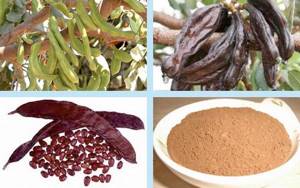
Carob
Unfortunately, almost any product has harm, including this Tsaregrad pod.



